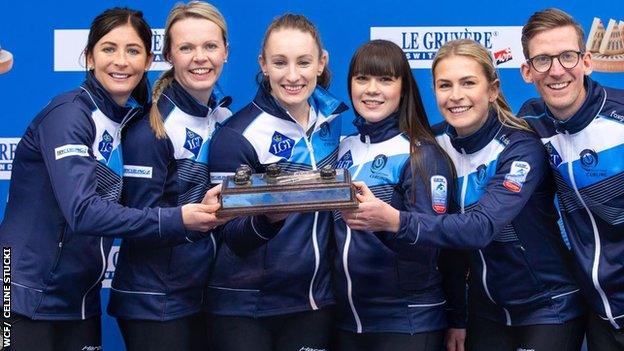Beijing 2022 curling qualifier: How it works & Scotland's chances
- Published

Scotland's women's rink must emerge from a qualifying tournament to reach the Olympics, having won the European title at the end of last month.
Eve Muirhead is aiming for a fourth Winter Olympics in February - but with just 56 days to go to the games the 2014 bronze medallist and her rink are yet to secure a place.
The newly crowned European Champions are in action in the final qualification tournament in the Netherlands, which begins on Saturday, in a bid to secure their spot at Beijing.
But why are they having to qualify? How does it work? And what are their chances?
How did we get here?
The Curling World Championships took place in May this year with the top seven places in the round-robin round qualifying for the Olympics.
Unusually, Scotland's women's rink performed below par and finished in eighth place. As a result, they now have to emerge from a nine-team tournament in Leeuwarden for the chance to nab one of three remaining spots in Beijing.
Bruce Mouat's men's rink got a silver at the world championships, and Mouat and Jennifer Dodds won the mixed doubles title, and so are already guaranteed their spots as Great Britain's representatives in those disciplines.
What is the format?
The nine teams will all play one another in a round-robin competition, with the country top of the standings at the end going straight through to the Olympics.
Those who finish second and third will play each other again, with the winner taking the second qualifying berth.
The loser will then meet the rink who finished fourth in the round-robin standings, with the triumphant nation sealing the final place. Ultimately, a top four finish is a must.
The women's teams competing are representing: Czech Republic, Estonia, Germany, Italy, Japan, Korea, Latvia, Scotland (will play as Great Britain at the Olympics) and Turkey.
What are Scotland's chances?
On paper, very good. Muirhead, Wright and Dodds were joined by newcomers Hailey Duff and Mili Smith as they stormed to the European title at the end of November.
They won eight of their nine matches in the first round, only losing to Italy, before defeating Germany and finally Sweden to take the crown in Lillehammer, Norway.
It means they have recent winning experience against four of their eight qualifying opponents, while they will still be favourites against the Italians, and Latvia too, who are not currently a strong force in curling.
Korea - silver medallists in Pyeongchang in 2018 - beat Muirhead's rink at the world championships and will prove a tough opponent.
Despite Scotland's status as one of the favourites, the qualifying event is often described as brutal given the stakes. There is little margin for error, which means staying cool under pressure will be key.
Great Britain has been involved in Olympic curling - for both men and women - since the sport was reintroduced to the programme in 1998.
The women's team missing out this time would be a setback for the sport.
"It's clearly going to be a very high calibre, important event that is do-or-die before the Olympics," Muirhead said.
"There's a lot of tricky teams there, but I'm looking forward to this. We're going to go there and once again be representing our country, so we want to do everyone proud, the same as we did at the Europeans and we'll definitely give it our all."